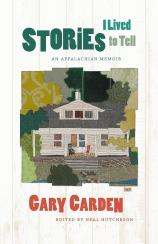Stories I Lived to Tell: An Appalachian Memoir
Review
Stories I Lived to Tell: An Appalachian Memoir
Now in his early 90s, acclaimed writer and raconteur Gary Carden combines his memories, culture, familial patterns and poetic gifts in STORIES I LIVED TO TELL.
Still living in the remote mountain cottage in Rhodes Cove, North Carolina --- where, at age two, he was unceremoniously left on the front porch to be raised by his grandparents --- Carden envisions “the canted floors and leaning walls” as beset by specters of the past. Such musing evokes vivid recollections. When feeling isolated from other children, he took the liberty of using his grandmother’s precious canning jars, setting them afloat in a flooded creek as a message-carrying medium to find potential playmates. His stalwart grandparents instilled in him values not only of an earlier century but of faraway lands. His grandmother seemed strangely convinced that a baby had drowned in the spring near their cottage and she could hear their cries. In college, Carden would learn that Ireland claimed many such haunted springs, doubtless the root of her imaginings.
"The material in STORIES I LIVED TO TELL is both pungent and poignant. It especially will be appreciated by North Carolinian readers and any open-minded and open-hearted explorer of America’s cultural bedrock."
Early on, Carden perceived that he was unusual in some way, with a sharp intellect and a reluctance to conform. Incidents depicted seem to prove both assertions, as when he sneaked a gun from his grandfather’s stash, aimed and shot above the heads of two school bullies. It caused a stir in the family but curtailed the tormentors’ jeering. Intertwined with a child’s imagining and adventures are reminders of Carden’s distraught family connections. His father, a promising local musician, was shot dead by a drunkard for no apparent reason, and there were those in the family who were considered “bad blood.” Carden himself was often warned by his grandparents to take care, as that blood may have been passed to him.
Although it often seemed that they wanted no role in protesting or improving local circumstances, Carden would learn later that in their way they had been activists in establishing their community and would see proof as they gladly tolerated a homeless, penniless, wandering woman. The revelations that are offered reach deep into Carden’s character. Once, as a young adult, he resolved to leave the old farmhouse for good but was lured back by the seeming melancholy of his cat, Booger, and his faithful terrier, Jack.
Despite his complicated, challenging origins, Carden would become a teacher, playwright and author. He won the prestigious North Carolina Award for Literature and for years has offered storytelling sessions and seminars based on his knowledge of Appalachian and Cherokee histories. The deftly woven yarns featured here are so varied as to invite rereading and are introduced in a lively narrative by the observant, widely recognized and award-winning author/filmmaker Neal Hutcheson, who has known Carden for many years.
Within the homebound scenery of Carden’s childhood are personal frustrations, gems of folk wisdom, a recounting of his region’s Cherokee heritage, and an emotive picture of an idealistic nearby commune created by former slaves. The material in STORIES I LIVED TO TELL is both pungent and poignant. It especially will be appreciated by North Carolinian readers and any open-minded and open-hearted explorer of America’s cultural bedrock.
Reviewed by Barbara Bamberger Scott on September 7, 2024
Stories I Lived to Tell: An Appalachian Memoir
- Publication Date: August 20, 2024
- Genres: Memoir, Nonfiction
- Paperback: 152 pages
- Publisher: University of North Carolina Press
- ISBN-10: 1469681579
- ISBN-13: 9781469681573





